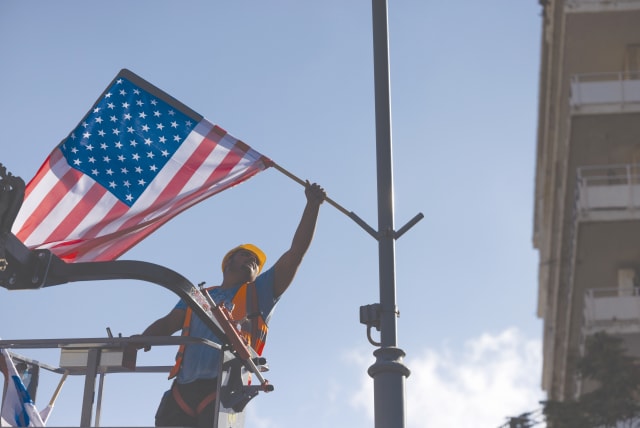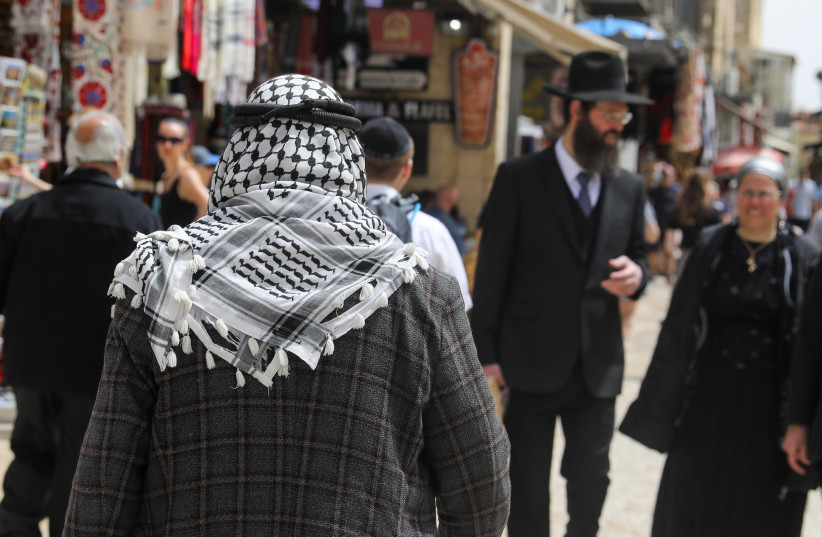Keep toxic US politics away from Israel - opinion

While the US is seeing relationships fall apart from disagreements, for the moment, Israel has social cohesion. It is dangerous to cause conflict between Israel and the diaspora by imposing US norms.
Recently, an American friend came over for Shabbat. Over dinner, he talked with pain about the strain in his marriage, as he supports the Republicans, and his wife votes for the Democrats. And although they have made an unwritten agreement not to talk about politics at all, the differences in their outlooks are threatening to tear their relationship apart.
Unfortunately, over the last several years, I have heard dozens of stories of broken friendships and distanced families over United States politics. And while we in Israel are no strangers to fierce ideological debates, thankfully, our society has maintained enough social cohesion for people to be able to stay on speaking terms even when they disagree.
This is why it is so disturbing that in the worst traditions of cancel culture, a group of 300 rabbinic leaders from the Reform, Conservative, and Reconstructionist movements has signed a letter vowing to boycott Religious Zionist members of the incoming Israeli government and to interfere with their ability to speak in the signers’ respective communities.
While this is an obvious case of virtue signaling and the signatories make up only 10% of their respective movements’ clergy, the trend of couching any aspect of the relationship between American Jewry and Israel in terms of boycotts is outrageous. Equally outrageous is the deafening silence of the liberal movements’ leadership, who have not taken the trouble to defend the Israel-Diaspora relationship nor to stand up for the cherished democratic value of free speech.
The boycott threat is unlikely to impact Israeli policy. The new government has much bigger fish to fry, as it needs to uphold its election promises of resuscitating the economy, returning personal safety to Israeli streets, dealing with the current educational crisis, and absorbing the largest wave of aliyah in three decades.
Consequences for the diaspora
Ironically, American Jewry is the one threatened most by boycotts. It is hard to imagine that the signing rabbis, as well as other American Jewish leaders, such as the ones who threatened Israeli Foreign Ministry officials with protests at a December 7 meeting in Washington, do not realize that by branding the current Israeli government as ultra-right and extremist they are stoking the flame of hatred and antisemitism towards themselves and their own communities.
If we have learned anything from the recent waves of antisemitism it is that haters do not distinguish between Israeli and American Jews. Israel’s major operation in Gaza in May 2021 was accompanied by a spike in antisemitic attacks in New York and Los Angeles. Discrediting the Israeli government as racist will undoubtedly bring about discreditation of Israel as a country and the backlash will be felt throughout American communities.
YET EVEN beyond the message, the medium is just as problematic. Over the past decade, members of BDS (Boycott, Divestment, and Sanctions) organizations have terrorized Jewish college students across American campuses. Pro-Palestinian activists have disrupted and sabotaged Israel-related events. Numerous student bodies (UC Berkley Law being the latest) have moved to boycott Zionist speakers altogether.
Now, the liberal Jewish clergy is taking a page out of the BDS playbook and undertaking to boycott and sabotage appearances by elected Israeli officials inside Jewish communities. If a Reform or a Conservative rabbi can block an Israeli minister from speaking in New York or Chicago, what moral authority is left for Jewish students and organizations to oppose the same move by pro-Palestinian groups at NYU or Northwestern?
It goes without saying that we all have the right to disagree and voice our opinions. American Jews on both sides of the political spectrum are entitled to criticize Israel and call out its government’s actions. This is a sign of caring. Debate, lobbying, and convincing are all legitimate tools in shaping public policy, while boycotts, threats and discreditation are not.
Over the past 18 months, many Diaspora Jews watched in horror as finance minister Avigdor Liberman used racist rhetoric against the Haredi community, called to throw the Haredi population into the dump, and discriminated against religious children in daycare. Many were concerned and outraged when the government trampled the value of Shabbat in the public sphere or tried to pass the conversion reform, which would have devastated the entire conversion system throughout the Diaspora.
Our organization and our colleagues met with Israeli officials, spoke to the press, wrote position papers, and lobbied in every way possible but at no point did it even cross our minds to discredit the Israeli government or boycott Israeli government members, even the ones from the extreme end of the political spectrum.
With the lessons of Hanukkah fresh in our minds, it is worth noting that, as in almost all matters of Jewish Law, we light candles based on the rulings of Beit Hillel and not those of Beit Shamai. Hillel’s approaches have become universal because his followers took the time to listen to the opposing view, reflect it back, and only then state their own opinion. Our ability to listen to each other, continue the conversation, and uphold the relationship is vital for the future of a united Jewish people on both sides of the Atlantic. It is even more critical for the survival of American Jewry.
And so, dear American liberal rabbis, please do not apply the toxic norms of American politics to your relationship with Israel. The price will be unbearable for us all.
The writer is the Israel director at Am Echad, an organization dedicated to strengthening the relationship between Israel and the Diaspora based on our mutual 3,000-year-long heritage.
Jerusalem Post Store
`; document.getElementById("linkPremium").innerHTML = cont; var divWithLink = document.getElementById("premium-link"); if (divWithLink !== null && divWithLink !== 'undefined') { divWithLink.style.border = "solid 1px #cb0f3e"; divWithLink.style.textAlign = "center"; divWithLink.style.marginBottom = "15px"; divWithLink.style.marginTop = "15px"; divWithLink.style.width = "100%"; divWithLink.style.backgroundColor = "#122952"; divWithLink.style.color = "#ffffff"; divWithLink.style.lineHeight = "1.5"; } } (function (v, i) { });

